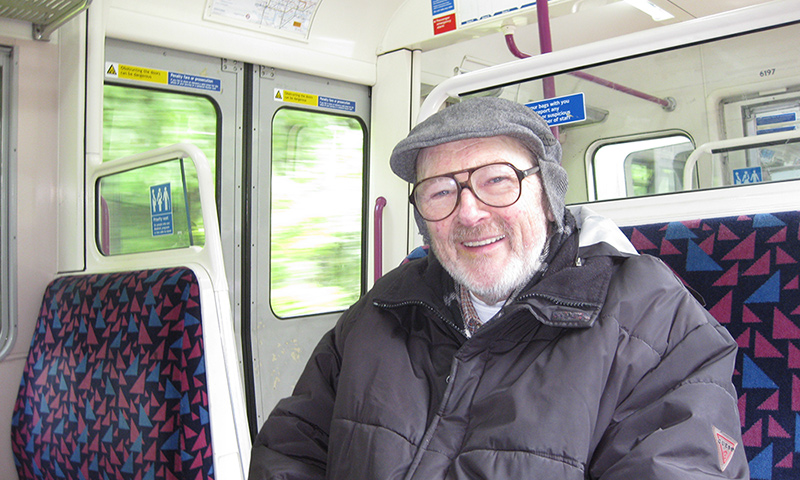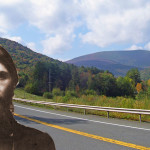I know very little about my parents’ courtship or their wedding. I also know very little about the day that I was born. I do, however, know where I was conceived.
I forget how the conversation started. I was about thirteen and my parents, our family friend Mimi, her daughter Rachel, and I were all talking and it just came up. Mimi mentioned that Rachel was conceived while visiting my parents’ house in Cape Elizabeth, Maine, where I was born and lived until I was four.
“Okay,” I thought, “so we’re talking about this now.”
“Well, Rob was conceived in Brooklyn,” my father said. This would have been in Mimi’s apartment, meaning that they conceived their children in each other’s houses.
My thirteen year old self thought something to the effect of, “well isn’t that a hoot! Hey, you know what would be great? Never talking about this again.” Early adolescence is perhaps the worst time for one to consider parental sex.
I’ve always wondered what it means when a married couple can point to the exact time of conception. Do they have sex so rarely that when it happens they can pinpoint it? Or is it that they’re planning and hoping so they have each ovulation down to a science?
On some level we all know that our parents had sex and I’m sure that they know that we, as children, have or are going to have sex. Beyond physical and emotional safety, I’m pretty okay with parental discussions regarding sex to be brief and binary. No elaboration, please.
I must say, though, that my Brooklyn conception makes me feel a little more entitled to live here. If I wore one of those “Made In Brooklyn” t-shirts from Brooklyn Industries, at the very least it would be accurate.
Now that I’m older or perhaps now that they’re gone and I can no longer ask questions, I do find myself wondering about their life together. While I doubt I would ever have done it, asking about their sex life would have been illuminating just because I want to know if they were ever happy. Because I had my doubts. They rarely did things together. They went to separate churches and they had separate interests. But now I want to know. Did they like marriage? Did they like being married to each other? Did they even like each other?
The time to have asked was probably after my mother died. Trying to pry intimate details from an Irish Catholic would have been futile and my taciturn father wouldn’t have been much easier but it would have been easier nonetheless.
I wasn’t thinking at the time that I would only have a six month window before he passed away. I don’t really remember being curious at that time, anyway. At that time, I was just worried.
The thing about my father in later years was that he had just gotten so damn slow. He visited me in New York and it would take him ten to fifteen minutes to walk a city block. I was actually annoyed with him about it. The annoyance wasn’t about my father walking slowly (though, as a New Yorker of close to a decade by that point, it was part of it) it was that I could see that something was clearly wrong and he wasn’t telling me what it was.
“Everything okay, Dad?”
“Yup, just a minute,” he would say as he stood still. He wasn’t breathing heavy or anything, he just needed to stop every now and then.
“You sure?”
“Uh huh.”
He had been more tired and weak for a long time. He had had open heart surgery twice in one year. The second was to repair a leak caused by the first. This happened to a man in his late 60’s.
After my mother died, we spent a few days together, mostly in the TV room off to the side of the living room in the darkness of upstate New York winter. He sat in his chair in flannel pajama bottoms with worn out slippers from LL Bean. He pulled a blanket around him, let his chin drop to his chest and he would fall asleep, snore, wake back up, repeat. I was so lonely with my father sitting right there.
A month or so after my mother died, he was taking trips. In addition to visiting me, he went down to North Carolina to visit his friend B.C. He also planned a trip for us to England, where he was born and raised, so we could see family and just take a vacation together.
When my dad was in North Carolina, his friend B.C. called me and asked me what was wrong. He said, “sometimes he’s all there and I think ‘oh, same old Bob.’ But other times, he just falls asleep.” I called my father and asked him about it and he laughed it off and told me not to worry, that he was fine.
“Are you sure?”
“Yes, of course” he said and I could hear his smile on the other end of the line.
When it was time to go to England, we were going to meet at JFK. He was connecting from Rochester and he was late. When he finally came to meet me, he was being pushed in a wheelchair. My heart sank. It would have taken him far too long to walk but still. What was wrong and why wasn’t he telling me?
England was fine and he made it around okay. We went to a Tottenham Hotspur soccer game. We took an open air double decker bus around London. We saw relatives that I only had a vague memory of meeting when I went in my early teens.

He often needed to sleep or spend a day at home wherever we were staying. He drove us all around, though, driving stick on the left side of the road. I remember seeing our cousin Anthony in Sheffield. He was having trouble parallel parking and I got frustrated. And I waved my arm to show him the direction the car should go to parallel park. “Come on, Dad!”
My father the parent was still taking care of me even as he knew that he was dying.
He wanted me to stay in England for two extra weeks with him. But I needed to get back, I thought. He didn’t press me on it. I needed to get back to what, though? To a job that I hated, a job that I would leave and never return to when my father died three weeks after the day that he dropped me off at Heathrow. We both got out of the car and I hugged him in his ubiquitous winter coat. He was big and I wrapped my arms around him. And I got choked up as he drove away.
It’s only occurred to me now that he knew that he was dying. He may not have had a prognosis but he knew on some level. He knew that he didn’t have much time to see friends or to go back to England. And he was right. He died a little over a week after her got home.
And now I can see him. My father the parent was still taking care of me even as he knew that he was dying. He was a seventy-two year old man who’s wife just died and he was tired. When we sat there together in front of the television, I thought only of my own loneliness, never his. When I waited for him on a street, I only thought about how his ailing health was effecting me. We talked daily and do you know what I would talk to him about? Do you want to know the topics I chose to discuss with my widowed father? Usually I would talk to him about frustrations over work and my dating life. Sometimes I would change the topic to something even more inconsequential.
“Dad, I think I’m losing my hair,” I said.
“Well, if you do, you’ll be handsome anyway,” he said.
Even then he let me talk and he listened. Christ, he was like the stump at the end of The Giving Tree. My friends have children now and I see how their children just need need need and I see how they’ve risen to the challenge. But maybe the needing isn’t just for infants and toddlers, maybe it never stops, not even when they’re in their thirties.
So, looking back, I shouldn’t have asked him about his marriage, I should have asked what it was like to have a kid. Did you like being a parent? What is it like taking care of a tiny selfish human? What about a bigger selfish human? How much did I take out of you?
After he died, I received an inheritance and I used that money to buy a home for myself in Brooklyn. I’ve been there for over three years now.
I still see Mimi and once, because I always remembered the conversation, I asked her, “so, where was the place that you lived where I was conceived?”
“Eighth avenue and second street,” she said, which is about three blocks from the apartment I bought.
It’s a coincidence but it’s a comforting coincidence. I walk past it every now and then. When my parents were in that building they were my age, relatively. They were probably feeling the days, months, and years passing faster but without any real gut understanding that the number of them is limited. In other words, they were still young, young enough to take a road trip down to Brooklyn from Maine to see a college friend. They hadn’t fallen prey to the killer of friendships – every day life. They had yet to give up.
In 1976, they were just friends visiting friends in their apartment. Maybe Mimi bummed a cigarette from my mom as they talked and laughed and I’m sure my mother drank too much. They probably had fun.
When I was twenty-five, my parents came down to New York to see me do a sketch comedy show. We all went out to the bar in The Ukrainian center in the East Village afterwards because the bar was always empty and we could take it over. My parents came too. They enjoyed the show and talked with my cast mates who got a kick out of them. My mother, cigarette perpetually between the fingers of her raised hand, spoke in her excited actress-without-an-outlet way and my father was next to her, smiling, genuinely enjoying being out with her.
They looked like a couple.
And now that I think about it, I do remember asking my father about their marriage. I remember once asking my father if they were happy together. “Well,” he said in his characteristically infuriating open ended way, “we had some good years.”
Some good years, he said, some good years.





Great picture of your dad. I remember being so happy that you two had taken the trip to England.